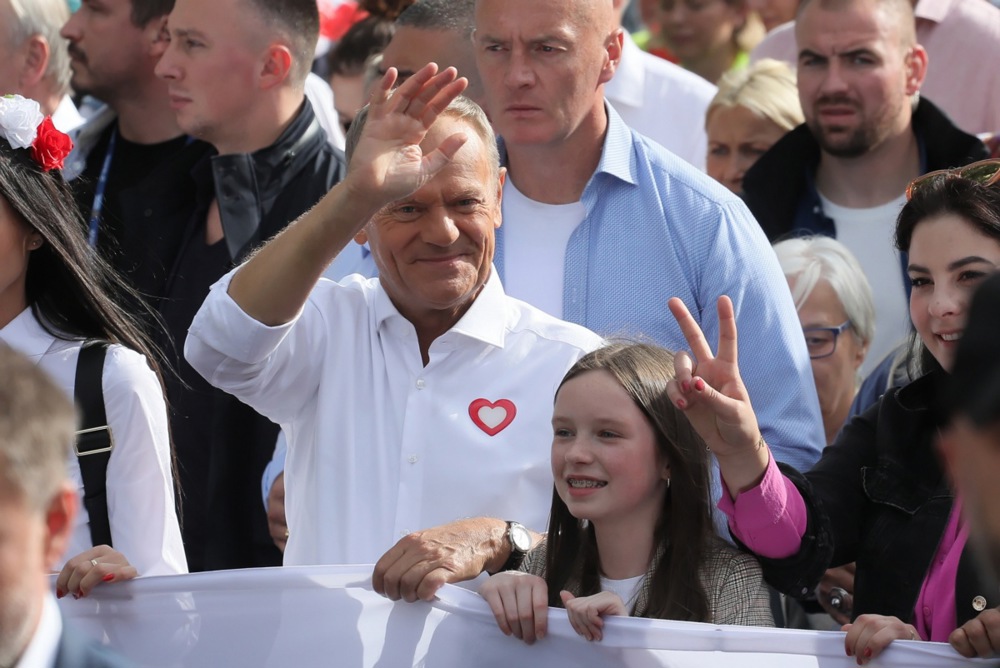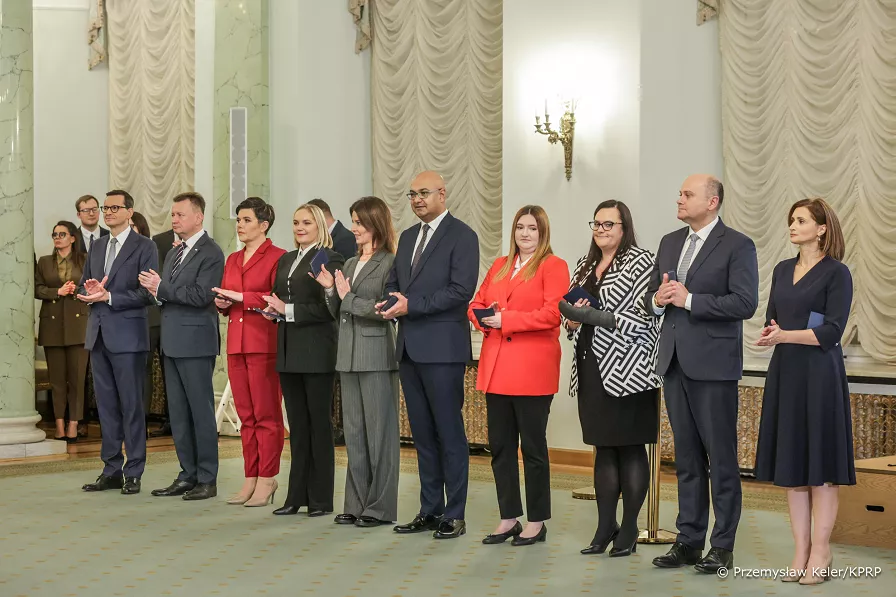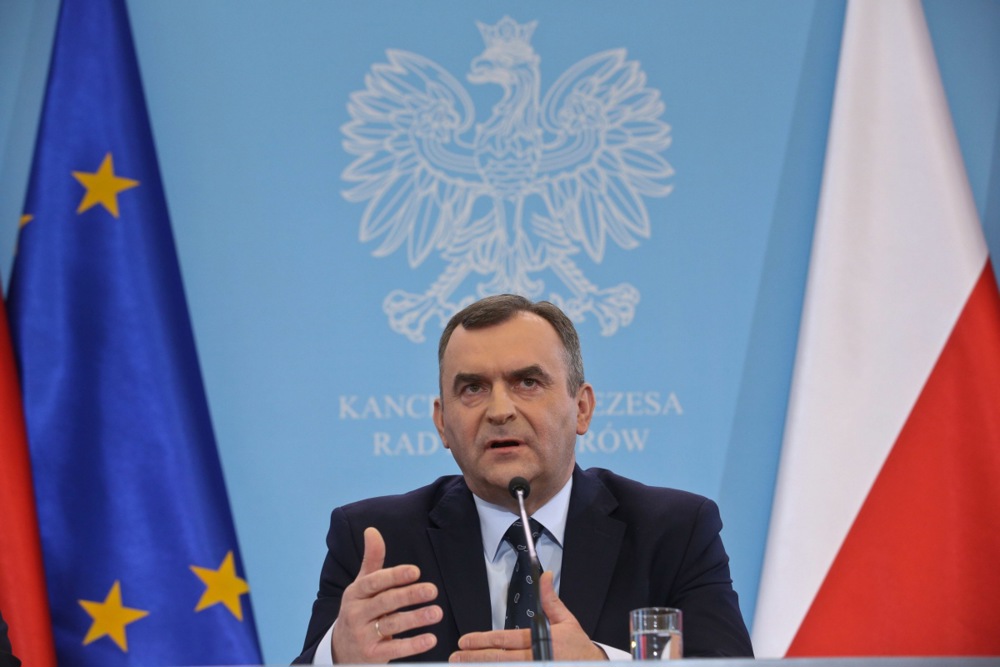Polish MPs from the opposition Conservative PiS party have spent a night at the headquarters of public broadcaster TVP amid efforts to purge the institution by the new Government.
The move on December 18 appeared to be a show of solidarity with journalists and managers threatened by Prime Minister Donald Tusk.
TVP‘s news channel TVP Info was on December 20 off-air after its signal was switched off, in what observers say is likely a result of Government action.
Moves against public media – and the judiciary appointed by the previous government – are also being contested by Polish President Andrzej Duda and the country’s Supreme and Constitutional courts.
The ruling majority led by Tusk on December 19 passed a resolution demanding action to make public media “impartial”.
Earlier, the justice minister had prepared a draft decree restricting the rights of judges nominated by Duda, while Parliament stated that the National Judicial Council appointed by the previous parliamentary majority was “unconstitutional”.
The Government is pledging to make public media “balanced, neutral and pluralistic” but opponents from the PiS argue the government is simply seizing control of it to silence Conservative voices and critics.
Those against the planned purge point to the fact that during the lifetime of Tusk’s previous government (2007-2014), many right-leaning journalists were dismissed from their roles.
Wynajęte osiłki Sienkiewicza próbują przejąć gabinet prezesa Matyszkowicza. Jesteśmy na Woronicza razem z posłami @Suwerenna_POL @pisorgpl. pic.twitter.com/TNhcKVGjZc
— Sebastian Łukaszewicz ?? (@S_Lukaszewicz) December 20, 2023
In a sign of the tensions between Polish public television and the Government, TVP was refused entry to a recent press conference with Tusk and denied accreditation to his visit to the EU summit on December 14-15.
Tusk recently told reporters that, for the time being, no public money was likely to be made available in the State budget for public television. If that is what transpires, TVP is expected to lose close to half of its current funding.
In response, PiS MPs petitioned the Constitutional Tribunal, or court, which is stacked with judges sympathetic to the party, to rule on whether the Government can take action aimed at liquidating public radio and television companies.
In an interim order, the court forbade any action by the authorities until it considers the matter at its next sitting planned for mid-January.
As part of the conflict, PiS leader Jarosław Kaczyński and his MPs left a session of Parliament and went to TVP’s headquarters to demonstrate their opposition to any Government actions against the station.
Kaczyński told reporters his party was “defending democracy and Polish sovereignty”, which he says are under threat. “There can be no democracy without media pluralism” he said.
On December 20, the minister of culture Bartłomiej Sienkiewicz announced he had taken a decision to dismiss the management boards of public television, radio and the Polish Press Agency, though his statement did not include any details as to whom he had appointed in their place.
They in turn, he said, had dismissed their CEOs and replaced them with others.
The legality of such moves will be challenged by the National Media Council, which was elected under the previous PiS government and which by law has the right to appoint and dismiss the management of public media.
Tak wygląda przejęcie niezależnych mediów. Piotr Zemło przewodniczący rady nadzorczej – nominat Bartłomieja Sienkiewicza. pic.twitter.com/7V4rj1DrGp
— Sebastian Łukaszewicz ?? (@S_Lukaszewicz) December 20, 2023
In a letter to Parliament speaker Szymon Holownia, pro-PiS Duda wrote that any changes to State-owned media must be carried out in line with legislation and the Constitution rather than by simple decree.
“Without questioning the right to introduce changes by the parliamentary majority, it should be emphasised that a political goal cannot constitute an excuse for violating or circumventing constitutional and statutory regulations,” he wrote.
Duda has also written to the Speaker of Parliament, warning that he will not accept any moves he considers to be unconstitutional, nor any questioning of his constitutional prerogative of appointing judges.
He was referring to justice minister Adam Bodnar’s draft ruling concerning judges appointed after the previous PiS government overhauled the National Judicial Council and who are set to be excluded from being assigned to cases.
The justice minister claimed he is simply enforcing rulings by European Union courts and acknowledging encouragement for judges to apply these rulings directly. This is contested by PiS and senior judges including the heads of the Supreme Court and Constitutional court
The chief justice of the Supreme Court, Małgorzata Manowska, slammed the changes announced by Bodnar, stating: “The new justice minister is beginning his term by submitting draft acts which, under the pretext of respecting international obligations, aim to violate the foundations of Poland’s constitutional order.”
Manowska argued that the minister was trying to “exclude a significant category of judges from the assignment of cases” and that was in conflict with the Constitution and would amount to “ drastic interference in the sphere of judicial independence”.
Julia Przyłębska, chief justice of the Constitutional court, claimed that “an environment is being created in which judges are afraid to rule … This is a violation of all standards of the rule of law”.
Krzysztof Szczucki, a former minister in the previous PiS government has also slammed the Bodnar proposals, saying that Duda has the final say on who is and who is not a judge and that there must be no segregation between lawyers appointed by him.
During his eight years in office, Duda has appointed 3,000 judges to courts at different levels and they have ruled in cases that could now arguably be open to challenge.
The Constitution gives the President the power to appoint judges, veto legislation and to grant pardons and is the Commander of the Armed Forces, but cannot dismiss governments and has limited powers to dissolve Parliament.
Disputes between the President on the one hand and government and parliament on the other should be resolved by the Constitutional court. The problem is that the new Government does not recognise the legitimacy of that court, questioning the assumption that members were elected in accordance with the Constitution.
The judicial reforms put in place by the previous PiS government were widely criticised by both the European Commission and the primary European courts, with reforms then recommended.
Such changes would require new legislation and that in turn would necessitate co-operation between the Head of State Duda, the Government and Parliament.
Trwa interwencja pogotowia!
Pani Poseł Joanna Borowiak pobita w TVP! Białoruś !!! pic.twitter.com/BnwgUyYjLx— Mariusz Kałużny (@m_kaluzny) December 20, 2023
https://twitter.com/gromotapl/status/1737424343833960631?s=20





